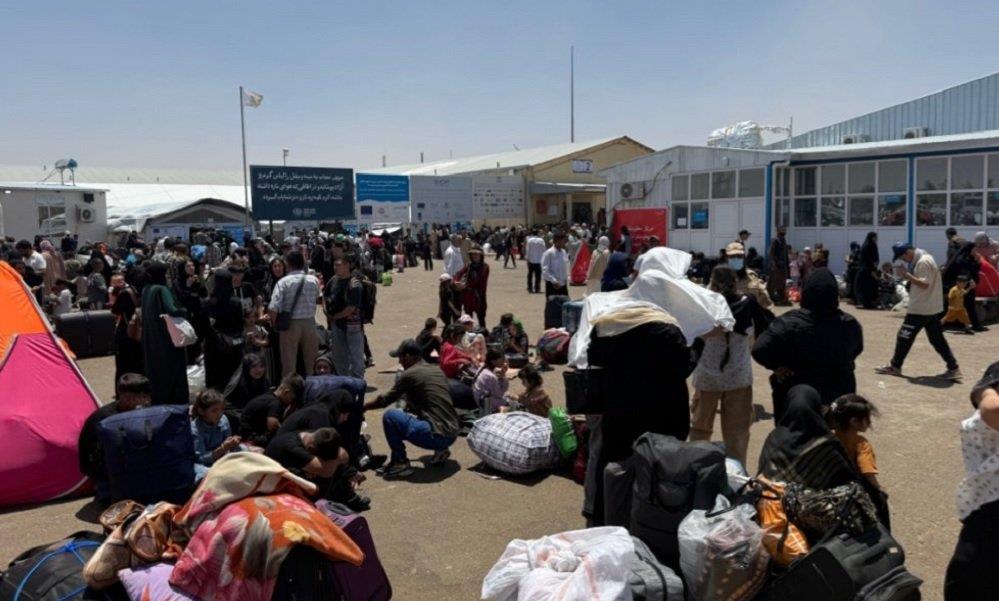
Deportations Of Afghan Refugees Could Help ISIS-K Recruit Vulnerable Returnees, Says Ex-UN Officials
A former United Nations counterterrorism official has warned that the mass deportation of Afghan refugees from Iran and Pakistan could create fertile ground for the expansion of ISIS-Khorasan, the regional branch of the Islamic State.
Hans-Jakob Schindler, a former member of the UN Monitoring Committee on ISIS, al-Qaeda, and the Taliban, told The Media Line that the risk of ISIS-K's resurgence was“very high.” He said the group could exploit the vulnerability of deported Afghans by recruiting among those who feel alienated, impoverished, and abandoned.
“Since August 2021, ISIS-K has been attracting not only disillusioned Taliban members but also Afghans who believe they have no place in the new regime,” Schindler explained. He warned that such conditions could destabilize the Taliban's control and threaten regional security.
Analysts and security experts have echoed his concerns, noting that forced repatriations could allow extremist networks to rebuild. Lucas Webber, a researcher at the Soufan Center, said many returnees face severe poverty and unemployment, making them susceptible to recruitment.“For desperate families, ISIS-K's financial incentives can seem appealing,” Weber said.
However, J.D. Maddox, a former CIA counterterrorism official, offered a more cautious assessment. He argued that only a small minority of returnees might be vulnerable to ISIS recruitment.“Most of these Afghans are not ideologically motivated,” Maddox said.“Their challenges are economic rather than extremist.”
Maddox also noted that ISIS-K has recently been more active in Iran and eastern Afghanistan, warning that deportees' familiarity with these areas could inadvertently benefit the group's logistical operations.
According to UN data, more than 1.2 million Afghan refugees have been deported from Iran and Pakistan so far this year. The large-scale expulsions have added pressure to Afghanistan's already collapsing economy, fueling unemployment and social unrest.
Regional experts say without coordinated international assistance to support reintegration, returning Afghans could become easy targets for recruitment by militant groups. They warn that continued instability could spill over into neighboring countries, reviving a cycle of violence that Afghanistan and the region are ill-prepared to contain.
ShareFacebook Twitter WhatsApp Email Print Telegram
Legal Disclaimer:
MENAFN provides the
information “as is” without warranty of any kind. We do not accept
any responsibility or liability for the accuracy, content, images,
videos, licenses, completeness, legality, or reliability of the information
contained in this article. If you have any complaints or copyright
issues related to this article, kindly contact the provider above.
Most popular stories
Market Research

- Mutuum Finance (MUTM) New Crypto Coin Eyes Next Price Increase As Phase 6 Reaches 50% Sold
- Bydfi Highlights 'BUIDL' Ethos During Newcastle United Match Against Arsenal
- Flexm Recognized As“Highly Commended” In The Regtech Category At The Asia Fintech Awards Singapore 2025
- Solotto Launches As Solana's First-Ever Community-Powered On-Chain Lottery
- Moonx: The Leading Crypto Trading Platform With X1000 Leverage And Unlimited Meme Coin Access
- Stonehaven Circle Marks 13Th Anniversary With Hadrian Colwyn Leading Calvio Ailegacyx Innovation




















Comments
No comment